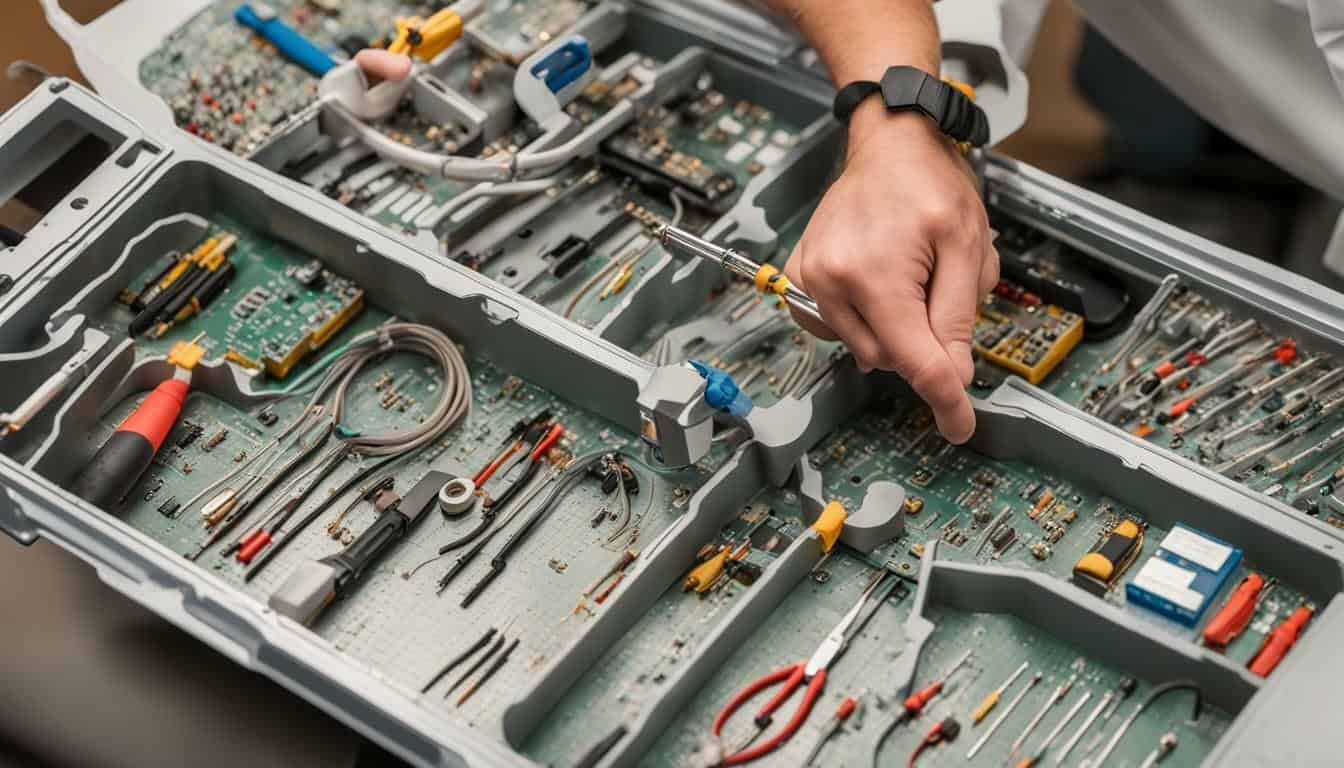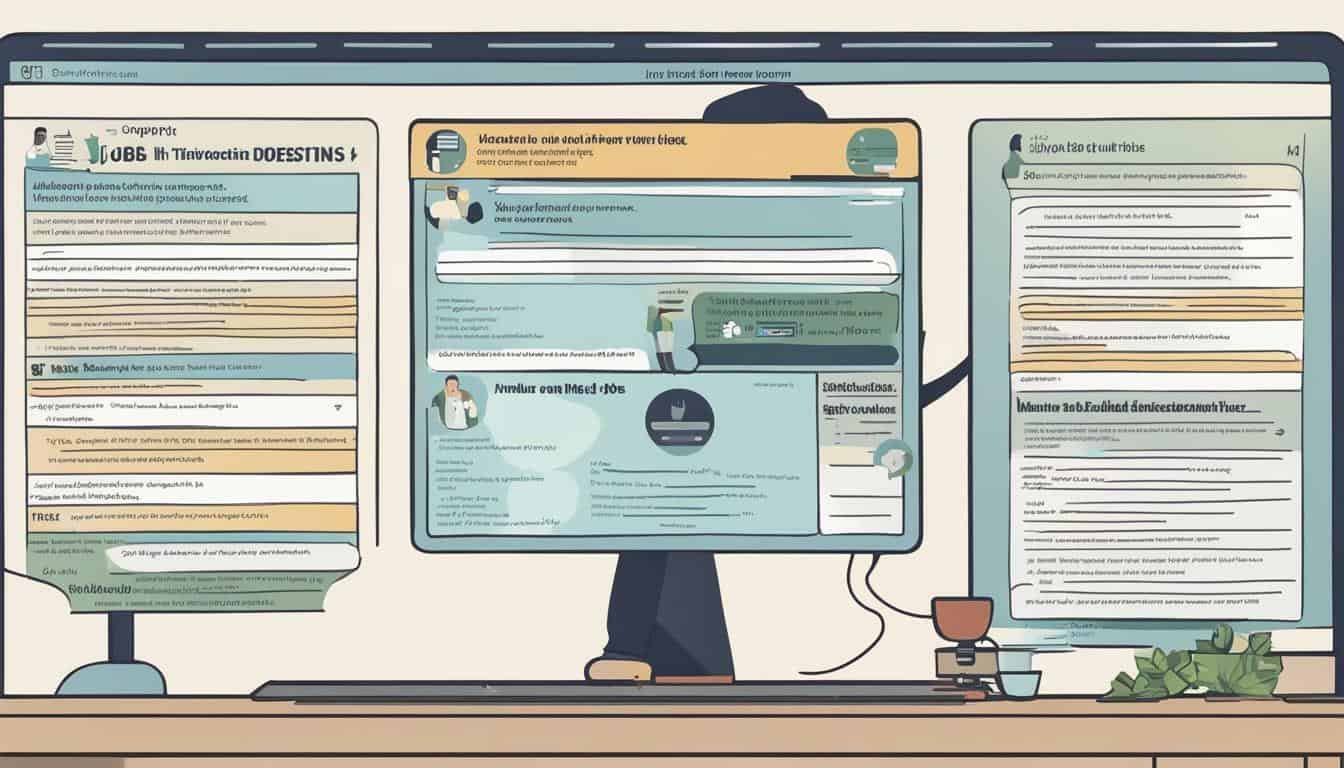If you’re looking for a challenging and rewarding career, becoming a biomedical equipment technician could be just what you need. As a biomedical equipment technician, you’ll play an important role in the healthcare industry, ensuring that crucial medical equipment is functioning properly and helping patients get the treatment they need.
In addition to making a difference in people’s lives, working as a biomedical equipment technician can also be financially rewarding. Biomedical technician salaries vary depending on experience and location, but the median pay for these professionals in the United States is around $52,000 per year. And with a growing demand for skilled technicians, there are plenty of opportunities to find biomed technician jobs across the country.
Key Takeaways:
- Biomedical equipment technicians play an important role in the healthcare industry, ensuring that vital medical equipment is functioning properly.
- The median salary for these professionals in the United States is around $52,000 per year.
- There is a growing demand for skilled biomedical equipment technicians, creating plenty of opportunities for those interested in pursuing this career path.
What Are Biomedical Equipment Technicians?
If you’re interested in the healthcare industry, but prefer a technical role, then a career as a biomedical equipment technician may be right for you. Biomedical equipment technicians are responsible for the maintenance, repair, and calibration of medical equipment used in hospitals, clinics, and other healthcare facilities.
These professionals play a critical role in ensuring that medical equipment is in working order and that patients receive accurate diagnoses and treatments. They work closely with healthcare professionals and are an integral part of the healthcare team.
The Importance of Biomedical Technology and Clinical Engineering
Biomedical equipment technicians have a strong background in biomedical technology and clinical engineering. Biomedical technology refers to the application of engineering and technology principles to the medical field, while clinical engineering involves the management of medical equipment and technology within healthcare facilities.
Biomedical equipment technicians use their knowledge of these fields to troubleshoot and repair medical equipment. They may also work with medical device manufacturers to identify and resolve issues with equipment.
If you have a passion for technology and a desire to make a difference in the healthcare industry, a career as a biomedical equipment technician may be the perfect fit for you.
Career Path and Education Requirements
If you’re interested in becoming a biomedical equipment technician, you should have a background in biomedical technology, medical equipment repair, and healthcare technology. Typically, a postsecondary certificate or associate degree is required to obtain this position.
Employers prefer candidates who have completed a formal training program in biomedical equipment technology or a related field. These programs provide hands-on experience in medical equipment repair and maintenance, as well as instruction in biomedical technology and healthcare technology.
Additionally, some employers may require certification from a recognized organization, such as the Association for the Advancement of Medical Instrumentation (AAMI) or the International Certification Commission for Clinical Engineering and Biomedical Technology (ICC).
As a biomedical equipment technician, it’s important to stay up-to-date with the latest advancements in biomedical technology and healthcare technology. This can be achieved through professional development opportunities, conferences, and continuing education courses.
Duties and Responsibilities of Biomedical Equipment Technicians
As a biomedical equipment technician, your primary responsibilities revolve around ensuring medical devices are functioning effectively and efficiently. This includes performing medical device repair and regularly scheduled biomedical equipment maintenance.
You will be responsible for conducting equipment assessments, troubleshooting, and repairing medical devices such as MRI machines, ultrasound equipment, and patient monitors. This requires a deep understanding of how these devices work and how to diagnose and repair any malfunctions.
Additionally, you will be responsible for documenting all repairs and maintenance performed on medical equipment. This documentation is critical for tracking the performance of medical devices and ensures that they are functioning correctly and safely.
As a biomedical equipment technician, you will need to keep up-to-date with new medical technologies and advancements in healthcare technology. This requires ongoing research and training to ensure you have the necessary skills to effectively maintain and repair medical devices.
Training and Certification Programs
If you’re considering a career as a biomedical equipment technician, it’s essential to have the necessary knowledge and skills to ensure success in the field. Fortunately, many training and certification programs are available to help you build a foundation in biomedical equipment services and healthcare technology.
Some of the specialized programs may include topics like medical equipment repair, troubleshooting, and maintenance. You can also expect to learn about the fundamentals of biomedical technology and its applications in the healthcare industry.
Attending a reputable program can help you gain hands-on experience and prepare for certification exams. By earning certification as a biomedical equipment technician, you can showcase your skills and knowledge to potential employers, increasing your chances of securing a position in the field.
Job Outlook and Salary Potential
As a biomedical equipment technician, you can expect to earn a competitive salary that reflects your specialized skills and expertise. According to the Bureau of Labor Statistics, the median salary for biomedical equipment technicians is $52,710 per year, with the top 10% earning more than $80,330 annually. Your salary may vary depending on your location, experience, and the type of employer you work for.
But it’s not just the salary that makes this a promising career path. The job outlook for biomedical equipment technicians is also very positive, with a projected growth rate of 4% between 2019 and 2029. This is due in part to the aging population, which requires additional medical care and equipment maintenance.
There are also many different types of jobs available for biomedical equipment technicians, including positions in hospitals, research facilities, and private companies. You may find work repairing, maintaining, or installing medical equipment, or working on the cutting edge of medical technology alongside clinical engineers and other healthcare professionals.
Overall, the potential for growth and satisfaction in this field is high, making it a great choice for anyone interested in pursuing a career as a biomedical equipment technician.
Advancement Opportunities and Specializations
As a biomedical equipment technician, you have various advancement opportunities and specializations available to you. One such area is clinical engineering, where you can work with medical professionals to develop and implement new healthcare technology.
You can also specialize in fields like radiology or surgery, where you can work with specialized medical equipment. Additionally, you can advance your career by becoming a manager or supervisor in a biomedical equipment services department.
To stay updated with the latest advancements in healthcare technology, it’s essential to continuously learn and upgrade your skills. The field of biomedical equipment technology is constantly evolving, and staying informed is crucial to your success.
Key Skills and Qualities for Success
If you are interested in becoming a biomedical equipment technician, there are several key skills and qualities that you will need to possess in order to succeed in this field.
First and foremost, you must have a strong technical background in both biomedical technology and healthcare technology. This will allow you to understand the complex systems and equipment used in the healthcare industry, and to troubleshoot any issues that may arise.
You should also have excellent communication skills, as you will be working closely with other healthcare professionals to ensure that all medical devices and equipment are in good working order. This includes being able to communicate technical information in a clear and concise manner, and being able to explain complex technical issues to those who may not have a technical background.
Attention to detail is also a critical skill for biomedical equipment technicians, as precision is essential when working with medical devices and equipment. You must be able to identify small details and potential problems in order to prevent bigger issues from arising.
Finally, you should have a strong work ethic and be willing to continually learn and update your skills in order to keep pace with advancements in healthcare technology. This includes staying up to date on new technologies and techniques, and seeking out additional training and education when necessary.
Conclusion
Congratulations! You now have a better understanding of the potential career path as a biomedical equipment technician. With a crucial role in the healthcare industry, there is a growing demand for skilled technicians to maintain, repair and install medical devices and equipment. By acquiring the necessary education and training, you can gain the specialized knowledge and skills required to become a successful biomedical equipment technician. The job outlook is bright, and with dedication and hard work, you can achieve a rewarding career with a promising salary. Remember, staying updated with the latest technological advancements is crucial to your success as a biomedical equipment technician. Continuously developing your skills and knowledge can lead to further specializations and advancement opportunities in areas such as clinical engineering. We hope this article has given you the information you need to make an informed decision about your career path as a biomedical equipment technician. Good luck with your future endeavors!Are the Skills and Training for Biomedical Equipment Technicians Similar to Maintenance Techs?
Biomedical equipment technicians and maintenance techs share similarities in skills and training. Both roles require a solid understanding of electrical systems and troubleshooting techniques. However, the specialized knowledge needed to unlock potential maintenance techs lies in biomedical equipment. This includes learning about medical devices, their calibration, and safety protocols unique to the healthcare environment. Enhancing their abilities in this area can make maintenance techs well-equipped to handle biomedical equipment-related tasks efficiently.
FAQ
Q: What is a biomedical equipment technician?
A: A biomedical equipment technician is a professional who is responsible for the maintenance, repair, and calibration of medical equipment used in healthcare facilities.
Q: What are the requirements to become a biomedical equipment technician?
A: To become a biomedical equipment technician, you typically need to complete a post-secondary program in biomedical technology or a related field. Some employers may also require certification or licensure.
Q: What are the job responsibilities of a biomedical equipment technician?
A: Biomedical equipment technicians are responsible for inspecting, testing, and repairing medical equipment. They also perform preventative maintenance, calibrate equipment, and keep detailed records of their work.
Q: Are there any specialized areas within the field of biomedical equipment technology?
A: Yes, biomedical equipment technicians can specialize in specific areas such as clinical engineering or healthcare technology. These specializations allow technicians to focus their skills and knowledge on specific types of equipment or medical settings.
Q: What is the salary potential for biomedical equipment technicians?
A: The salary potential for biomedical equipment technicians can vary depending on factors such as experience, education, location, and the employer. However, the average salary for biomedical equipment technicians is competitive and offers opportunities for growth.
Q: What are some key skills and qualities needed for success as a biomedical equipment technician?
A: Some key skills and qualities for success as a biomedical equipment technician include technical expertise in biomedical technology, problem-solving skills, attention to detail, and strong communication abilities.




0 Comments